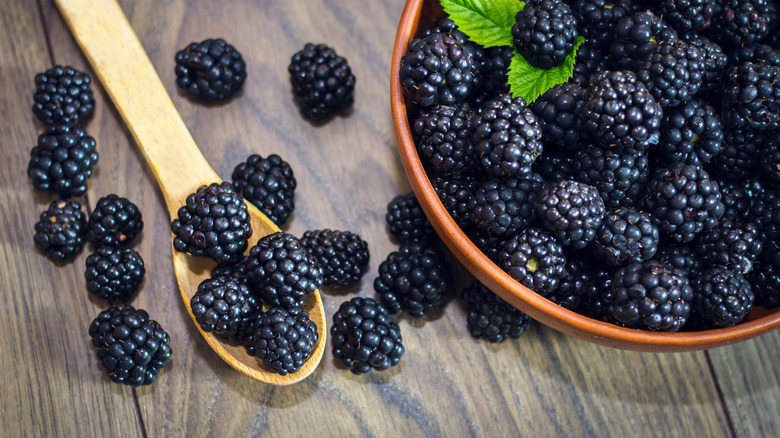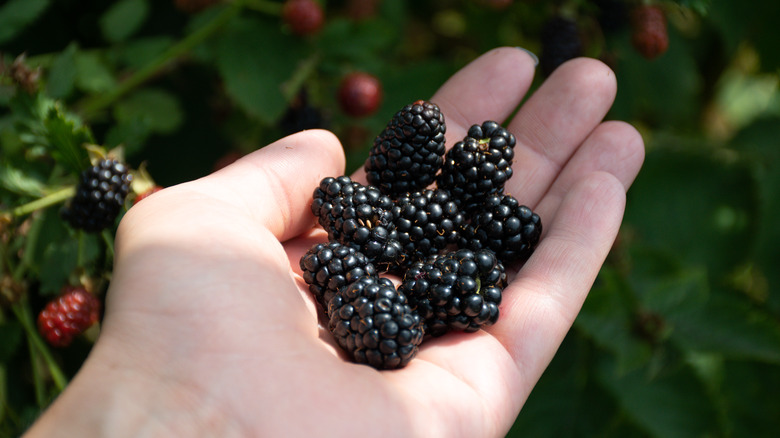The Deliciously Tart Berry You Need To Try If You Like Blackberries
The world is a pretty sweet place for berry lovers. The bright little fruits are delightful to eat in all manner of ways, as tasty out of hand as they are in a classic pie. Everybody has a favorite, ranging from sweet strawberries to juicy cloudberries, and each berry has its own strengths. But there's something particularly special about the tart, shiny blackberry. This powerhouse fruit's robust flavor is incredibly versatile: Blackberries are at home in warm cobblers, refreshing smoothies, and crisp salads. They pair well with a variety of different ingredients, grow vigorously, and even look attractive on the plate. No wonder humanity has been cultivating them for thousands of years, as Garden Guides details.
Blackberries are also a fascinatingly diverse fruit. There are dozens of different cultivars in existence, with a wide range of strengths: Some boast impressively high yields, some can be harvested by machines, some are thornless, and many feature unique flavors. One blackberry variety is especially delicious — and you've probably never heard of it.
The outstanding olallieberry
According to The Los Angeles Times, the olallieberry's genesis lies in Oregon State University, where it was developed as part of a program involving the U.S. Department of Agriculture. As Serious Eats points out, the olallieberry is something of a patchwork: It's a cross between loganberries and youngberries, which are themselves crosses of multiple berries. Essentially, the olallieberry borrows from blackberries, raspberries, and dewberries, but is best understood as a type of blackberry. The fantastic fruit was unleashed upon the world in 1950. It quickly left its birthplace behind. The olallieberry is happiest on the California coast, where it isn't threatened by harsh winter cold. There, it can be found in diner pies, pick-your-own farms, and even wineries.
What earns the olallieberry its legions of devotees? Delicious flavor, robust texture, and versatility. Like blackberries, olallieberries are decidedly tart, but their tartness comes with a uniquely zingy brightness. They're also sweet, but not overpoweringly so, making them a perfect ingredient in decadent desserts like pie a la mode. They're also a good choice for preservation, though jam-makers should be sure to keep an eye on the stove as they cook them because olallieberries are high in pectin, and easily become goopy. If you're outside of California, olallieberries might be difficult to find — they're decidedly perishable and don't travel well across long distances. Luckily, the magic of the internet means you can order olallieberry creations like jams and curds directly from the Golden State.
Meet the olallieberry family
The olallieberry is the product of advanced science. But it's not an endpoint — science is, after all, a ceaseless progression of study, analysis, and creation. Blackberry fans, rejoice! This means the olallieberry is just one of many closely-related blackberry offshoots you need to try as soon as possible. What's more, new varieties are being created every day.
Take the Loganberry, one of the olallieberry's parent varieties. As Oregon State University notes, this berry is known for its unique flavor, which blends raspberry and blackberry. Like the idea of a cross between blackberries and raspberries? Then you need to check out the tayberry, which puts a slightly sweeter spin on the blackberry's classic tartness. If you can't get your hands on those delicate and hard-to-produce berries, how about the boysenberry? Close kin to olallieberries, it also combines raspberry, blackberry, dewberry, and loganberry genes into one flavorful package.
Olallieberries have even parented their own offshoot fruits, which are just as delicious. Meet the marionberry, a cross between the olallieberry and the Chehalem berry. This irresistible creation requires a bit of effort on the picker's part, what with its spiny canes, but it's well worth it because these are some seriously mouth-watering berries. They tend to be a bit sweeter than many other blackberry offshoots and can be used in a wide variety of baked goods and preserves. In fact, marionberry pie has become an icon of Oregonian cuisine.


